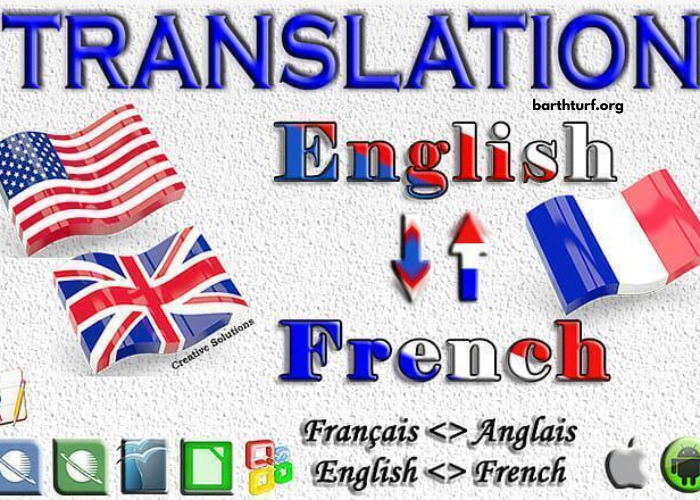In today’s globalized world, communication across languages is becoming more important than ever. One of the most common language translation needs is the ability to Translate English to French. Whether for business, travel, or education, mastering the art of translation between these two languages opens doors to new opportunities and cultural connections. English and French are two of the world’s most widely spoken languages, making the need to Translate English to French highly relevant across various industries.
The process of Translate English to French involves more than just substituting words from one language to another; it requires understanding the context, nuances, and cultural differences between the languages. Translating properly not only helps in conveying the message accurately but also ensures that the intended meaning is preserved. Whether it’s a formal document, a casual conversation, or technical content, Translate English to French requires attention to detail and proficiency in both languages.
In this article, we will explore the importance of being able to Translate English to French, the challenges involved, and tips to improve your translation skills. Additionally, we will examine some tools and techniques that can aid in providing accurate translations, ensuring that your ability to Translate English to French can meet the needs of both professional and personal communication.
What Are the Challenges When You Translate English to French?
Translating between English and French presents several challenges that require a deep understanding of both languages. One of the most significant difficulties when you Translate English to French is the difference in sentence structure. English tends to use a subject-verb-object format, while French often places adjectives after nouns and can change word order depending on the context. These structural differences can make direct translations inaccurate or awkward.
Another challenge when you Translate English to French lies in the use of idiomatic expressions. Idioms often don’t have direct equivalents in the target language, so a literal translation may not make sense. For example, the English phrase “It’s raining cats and dogs” cannot be directly translated into French. Instead, a French equivalent like “Il pleut des cordes” must be used, which means “It’s raining ropes.”
Cultural differences also come into play when you Translate English to French. Certain expressions or references may be culturally specific, and the translator must find a way to adapt the message in a way that is meaningful to the target audience. This requires not only language proficiency but also cultural sensitivity. It’s essential to consider the cultural context when translating between these two languages to ensure clarity and appropriateness in communication.
How Can You Improve Your Skills to Translate English to French Effectively?
To improve your ability to Translate English to French effectively, one of the most important steps is to become deeply familiar with both languages. This means not only understanding grammar and vocabulary but also learning about the culture, idiomatic expressions, and nuances of each language. A deep cultural understanding can help you make more accurate translations and avoid misunderstandings.
Another tip for improving your ability to Translate English to French is to practice regularly. Like any skill, translation improves with constant practice and exposure. By reading books, articles, or watching content in both languages, you can become more adept at identifying nuances and improving your translation accuracy. Additionally, translating different types of content, such as formal, casual, and technical texts, can help broaden your understanding and adaptability in different translation scenarios.
Using online tools and translation resources can also enhance your ability to Translate English to French. Many tools offer suggestions for vocabulary, sentence structures, and even context-specific translations. However, it’s important to use these tools carefully, as automated translations may not always convey the right meaning or tone. Over time, you’ll learn to rely on these resources as aids while refining your skills for more advanced and precise translations.
When Do You Need to Translate English to French?
There are many instances in which you may need to Translate English to French. In business, for example, multinational companies often require translated documents, presentations, and emails to communicate with clients, colleagues, and stakeholders who speak French. This ensures that all parties are on the same page and prevents costly misunderstandings.
In academic settings, students and researchers may need to Translate English to French for various purposes, such as translating research papers, theses, or articles from French sources into English and vice versa. In international relations, diplomats often require professional translations to facilitate negotiations and treaties between English-speaking and French-speaking countries.
Additionally, in everyday life, individuals traveling to French-speaking regions or communicating with French-speaking friends and family members often need to Translate English to French for personal use. From understanding signs and menus to sending messages, the ability to translate accurately is essential for smooth communication.
What Tools Are Available to Help You Translate English to French?
There are many tools available to assist with the process of Translate English to French, ranging from online translation engines to specialized software. Some of the most popular tools include Google Translate, DeepL, and Microsoft Translator. These platforms offer quick translations for both individuals and businesses, making it easier to communicate across languages.
While these tools are valuable for quick and general translations, they are not always perfect. Automated systems may struggle with nuances, idiomatic phrases, or specialized vocabulary. For professional or important documents, it’s always recommended to use a human translator who can provide more accurate and contextually relevant translations.
There are also dictionaries and thesauruses available for both languages, which can help you expand your vocabulary and improve your translation skills. Many of these resources offer suggestions for synonyms and word choices, allowing you to select the most appropriate term for your translation.
How Can Technology Assist in Your Ability to Translate English to French?
Technology plays a crucial role in helping individuals and businesses Translate English to French with greater efficiency and accuracy. Artificial intelligence and machine learning have made significant strides in translation technology, offering more advanced and context-aware tools. These AI-driven tools are now capable of recognizing language patterns, regional dialects, and contextual meaning to provide more accurate translations than ever before.
In addition to automated translation tools, speech-to-text technology can help you Translate English to French in real time. For example, if you’re having a conversation in English and need to translate it into French quickly, speech recognition software can transcribe and translate your spoken words into the target language. This is particularly useful for travelers or those who need to communicate in a hurry.
Furthermore, translation management software can help streamline the translation process for businesses and teams, ensuring that documents are translated consistently and accurately across multiple languages. These tools are especially useful for large-scale projects that require translating multiple pieces of content efficiently.
Conclusion
In conclusion, the ability to Translate English to French is an invaluable skill for communication in various contexts, whether personal, academic, or professional. With the right tools, practice, and cultural understanding, anyone can improve their translation skills and effectively bridge the gap between these two widely spoken languages.
While technology can assist with the process of Translate English to French, it’s important to remember that true mastery comes from continuous learning and experience. By honing your language skills and embracing both traditional and digital resources, you can become proficient at translating between these two rich languages and enjoy smoother, more effective communication.



